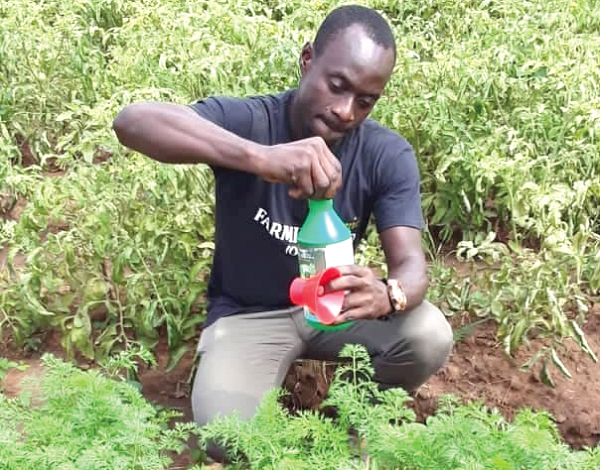
Study discovers organic fertiliser for high yields
A study by the Savannah Agricultural Research Institute (SARI) of the Centre for Scientific and Industrial Research (CSIR) has recommended to farmers the use of a locally made organic fertiliser to improve the yields of three staple crops.
The study concluded that the use of organic farming aid (OFA), a liquid wood vinegar, used on its own or combined with inorganic fertiliser such as NPK, allowed farmers to reap high yields and maximum value in the cultivation of maize, cowpea and groundnut.
Advertisement
Smallholder farmers with one-hectare farms could invest about GH¢55 in the liquid fertiliser, which costs far less than NPK, to increase their profits three-fold, from GH₵1,000 to GH₵3,000 in a growing season.
“If farmers want even higher yields, they can combine OFA with reduced amounts of NPK to achieve that outcome,” the report said.
The organic yield enhancer, pest and fungi control agro-input is being produced in Ghana by HJA-Africa.
Objective of study
The study sought to determine the effect of the application of OFA on the improvement of the growth and yield of maize, its protective properties in terms of managing aflatoxin contamination in groundnut and its ability to manage cowpea pests compared to synthetic insecticides.
The research was carried out at the research fields of the CSIR-SARI at Nyankpala in Tamale, as well as some selected farms in the Sagnarigu municipality in the Northern Region, during the 2021 cropping season.
Cheaper cost of OFA
The findings of the study, released last month, pointed out that the cost of standard synthetic fertiliser (NPK) was now four times higher than it was two years ago, with even subsidised NPK now selling at GH₵320 a bag and around GH₵400 at market prices.
“The results showed both OFA and NPK gave revenue benefits from increased yield greater than their costs, but the highest profit per hectare was from OFA plus 50 per cent NPK, while the highest revenue-to-cost ratio (most efficient investment) was from OFA.
“The substantial increase in profitability seen in these trials from the use of OFA, either on its own or in combination with 50 per cent NPK, supports recommending OFA to maize farmers for yield enhancement, in combination with NPK or on its own,” they said.
“The research also observes that irrespective of the frequency of application of OFA to maize, either two or three times, the highest economic returns were achieved when 100 per cent OFA plus 50 per cent NPK was applied.
“However, for the best economic returns, applying 100 per cent OFA plus 50 per cent NPK two times to maize could be recommended,” the findings said.
Experiments on maize
The trial involved fives fields, namely: a control plot that did not receive any fertiliser or OFA, an OFA-only recommended field, an NPK-only recommended field, a field for equal application of OFA and NPK and a 100 per cent OFA + 50 per cent NPK field.
To check farmer perceptions of the treatment results, the researchers invited local farmers to view the trials one and two sites before harvest, to say which treatment results they preferred from visual inspection.
“For trial one, 20 farmers preferred the OFA plus 50 per cent NPK, while 22 preferred the 100 per cent NPK; and for trial two, 28 farmers preferred the OFA plus 50 per cent NPK, with 18 preferring the 100 per cent NPK.
“Overall, these results showed both OFA and 100 per cent NPK increasing maize yields, 100 per cent NPK by a larger amount, but adding OFA to 50 per cent NPK generally performed similarly to NPK 100 per cent, both in terms of yields and farmer perceptions,” it said.
Farmers’ preference
Another experiment was carried out to determine the effect of OFA on aflatoxin concentration and the productivity of groundnut, as well as another experiment to determine the effect of different rates of OFA and synthetic insecticide on cowpea pests and productivity.
From the farmer field days carried out, the study said majority of farmers selected plots treated with 100 per cent OFA plus 50 per cent NPK.



